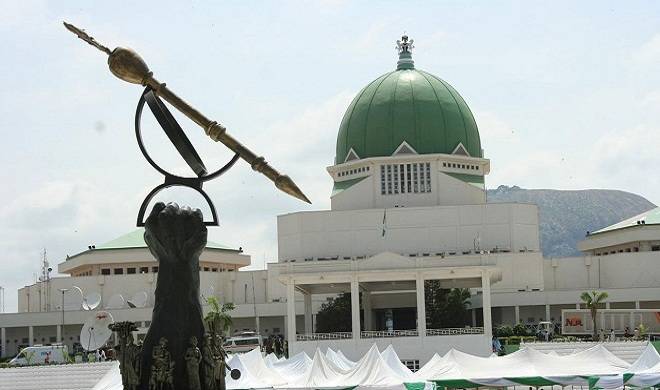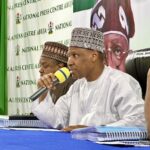
Is it possible for the opposition to have more money than the incumbent in a Nigerian election contest? President Buhari himself raised this question when he told members of the Buhari Media Support Organisation that visited him last Friday that his political opponents are sitting on “incredible financial resources” ahead of next year’s elections. The president said despite his standing as the incumbent, he could not stop the mischief the opposition was sponsoring against his government from different angles because of the money at their disposal.
I agree entirely that in Nigeria, a candidate in an election should be very worried if he believes that his opponent has more money than he himself has. Throughout the world money is an important factor in elections but in Nigeria, it is doubly, triply so. As elsewhere money is needed in an election campaign for acquiring and maintaining campaign vehicles, opening and maintaining campaign offices and staff, printing and distributing posters and souvenirs, hiring halls and squares for rallies, accommodating campaign officials in hotel rooms, endless travel, lawyers’ briefs and paying “deposits” to the party and INEC to purchase and return election forms. Agents manning polling booths also have to be paid, which is a major expense.
These are only the open expenses, however. Both during the primaries and the general election, a candidate must “mobilise” support. The first think your campaign workers will tell you is that you must bring “the tools” for mobilisation. In Nigeria, political mobilisation is a complex amalgam of personal contact, appeal to primordial sentiments, media campaign, good looks in campaign posters, calling in personal IOUs, deploying every social power including friends, parents, in-laws, classmates, fellow church members, prayer warriors, marabouts and traditional rulers; wheeling and dealing; personal promises of appointments and contracts; emergency marriages; and monetary bribery. The latter is particularly costly because it is under the table and with no upper limit.
Nor is it targeted or focused. When a candidate is on the campaign trail, he must “drop something” at every stop, for party officials, thugs, godfathers, royal fathers, clerics, security agents, journalists and “supporters.” The latter is a particularly nebulous term because in all Nigerian cities and towns, active youth groups mobilise to “welcome” every politician that pays a visit, irrespective of party affiliation, so it is impossible to say who they really support until they cast their votes.
Where does this money come from? First of all, from personal funds. To the extent that most of the persons who develop an ambition for an elected office such as president, governor or senator are either wealthy businessmen or retired civil servants who held “juicy” posts before, many of them enter politics with ample personal funds. In Nigeria, anyone who ventures into politics just because he thinks he is intellectually endowed, is a gifted orator or has a very good plan for national or community development is usually seen by his peers as a mad person. The only question your friends and colleagues ask if you want to venture into politics is, “Do you have money?” Aspirants sell houses, farms, cattle, shares and borrow heavily in order to finance election campaigns.
Personal funds apart, an aspirant might also get money from a godfather, from friends and associates, from companies and contractors he patronized when he was in service, or from foreign sources if he is well connected. Most of these sources are unreliable and are based on calculations of whether the person is likely to win the election, since he is expected to repay the money after he wins.
Most campaign funds in Nigeria are however taken from the public treasury. A lot of money comes from beneficiaries of oil blocs and import duty waivers, from mega contractors and from big private firms that depend on the goodwill of government but easily the most money comes from inflated contracts and from security votes. From what we hear, the Jonathan regime carried matters to higher levels by sending billions of naira into the National Security Adviser’s office in the name of weapons purchases and other security spending, then siphoned it away and deployed it to the 2015 election campaign.
Now, the Jonathan regime was ousted in 2015, so PDP has no access to such slush funds now. If anyone has such access now, it is APC and its officials. We have no evidence yet that they are amassing money for the campaign, but how could PDP have more money this time around than APC has? The president probably believes that they still have some of the purloined money stashed somewhere. As president, he could even have the evidence. Reason however suggests that PDP cannot have as much money as it had in 2015. Even if some money was left over from 2015, the nature of politicians is such that they would quickly convert the leftover funds to personal use. Even if there are several pockets of the Ikoyi-like dollars hidden in some places, they are no longer party funds. In America, diverting campaign funds to personal use is a very serious offence. Here, there is no distinction between the two.
Probably the richest source of funds PDP has today is that it controls 11 state governments, some of them very liquid such as Rivers, Akwa Ibom, Bayelsa and Delta. APC however controls 24 state governments, though some of them barely get by. Naira for naira therefore, PDP is very unlikely to outpoint APC in 2019 election spending. Let us however remember that despite that out-of-this-world spending in 2015, PDP still lost the election. Some people will say that APC also spent a lot of money in 2015 but it could not have matched PDP’s spending. That means money, important though it is, is not the only winning factor in Nigerian politics. Buhari’s massive personal popularity plus the PDP regime’s massive unpopularity managed to overcome PDP’s massive spending, but only just. President Jonathan said afterwards that the margin “is only two million votes.” Without the money PDP could not get in 2019 as many votes as it got in 2015. Buhari too might not get as many votes as he got in 2015 because his supporters’ zeal has somewhat waned. All he needs however is a few votes more than the opposition, plus the geographical spread.
For Buhari and APC, the big psychological difference between 2015 and 2019 is that not as many people would be willing to make personal sacrifices because they are now seen as incumbents who have more money. People might not expect Buhari to give them money, given his well-known character, but they would still expect APC campaign workers, not to mention other APC candidates, to dish out money. Where many people trekked long distances to attend Buhari campaign rallies in 2015, this time around they will sit and wait for vehicles to take them to the rally venue.
The president did not seem to recognize this psychological shift when he told the Media Support Group that visited him, “I know you are doing it as a sacrifice, physical, mental and material…You have proven to people that you are not here for material things. Your opinion is out of sacrifice and the strength and moral courage you have…” Maybe that is so, but it will be a risk to expect party workers and polling agents all over the country to be equally altruistic. In 2015 Buhari even appealed to supporters to buy scratch cards and contribute to his campaign, until PDP blocked the e-channel. If a similar appeal is made this time around, supporters might not take it very seriously.
Assuming it has not done so, APC must begin to find some campaign money as we approach 2019. I am just wondering; maybe EFCC was hasty when it rounded up PDP top shots in several states last week over 2015 campaign spending. Chances are, we are not yet through with lavish campaign spending in this country. Even CBN expressed fears for the naira’s stability as we approach 2019.

 Join Daily Trust WhatsApp Community For Quick Access To News and Happenings Around You.
Join Daily Trust WhatsApp Community For Quick Access To News and Happenings Around You.


